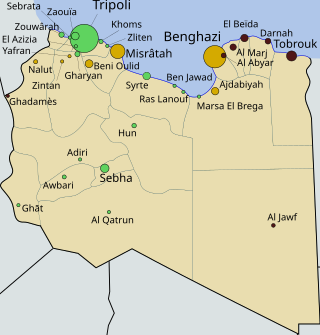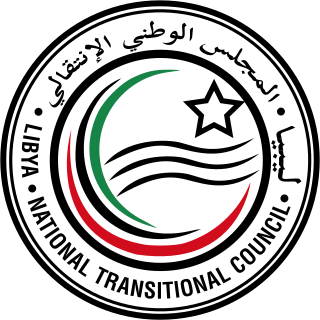
Libya's history involves its rich mix of ethnic groups, including the indigenous Berbers/Amazigh people. Amazigh have been present throughout the entire history of the country. For most of its history, Libya has been subjected to varying degrees of foreign control, from Europe, Asia, and Africa.

Saif al-Islam Muammar al-Gaddafi is a Libyan political figure. He is the second son of the late Libyan leader Muammar Gaddafi and his second wife Safia Farkash. He was a part of his father's inner circle, performing public relations and diplomatic roles on his behalf. He publicly turned down his father's offer of the country's second highest post and held no official government position. According to United States Department of State officials in Tripoli, during his father's reign, he was the second most widely recognized person in Libya, being at times the de facto prime minister, and was mentioned as a possible successor, though he rejected this. An arrest warrant was issued for him on 27 June 2011 by the International Criminal Court (ICC) for charges of crimes against humanity against the Libyan people, for killing and persecuting civilians, under Articles 7(1)(a) and 7(1)(h) of the Rome statute. He denied the charges.
Zintan is a city in northwestern Libya, situated roughly 136 kilometres (85 mi) southwest of Tripoli, in the area. The city and its surrounding area has a population of 16,024.

The Libyan civil war, also known as the First Libyan Civil War, was an armed conflict in 2011 in the North African country of Libya that was fought between forces loyal to Colonel Muammar Gaddafi and rebel groups that were seeking to oust his government. The war was preceded by protests in Zawiya on 8 August 2009 and finally ignited by protests in Benghazi beginning on Tuesday 15 February 2011, which led to clashes with security forces who fired on the crowd. The protests escalated into a rebellion that spread across the country, with the forces opposing Gaddafi establishing an interim governing body, the National Transitional Council.
The Nafusa Mountains campaign was a series of battles in the Libyan Civil War, fought between loyalist pro-Gaddafi forces and rebel anti-Gaddafi forces in the Nafusa Mountains and, at a later period, in the surrounding plains of western Libya. The mountain range is of strategic importance due to its close proximity to the capital of Tripoli. Along with the city of Misrata, the Nafusa Mountains region was one of the major rebel strongholds in Tripolitania.

The Libyan Civil War began on 15 February 2011 as a chain of civil protests and later evolved into a widespread uprising against the regime of Muammar Gaddafi. On 25 February, most of eastern Libya was reported to be under the control of protesters and rebel forces. Gaddafi remained in control of the cities of Tripoli, Sirte and Sabha. By 15 March, however, Gaddafi's forces had retaken more than half a dozen lost cities. Except for most of Cyrenaica and a few Tripolitania cities the majority of cities had returned to Gaddafi government control.

The Tripoli Revolutionaries Brigade, also known as the Free Tripoli Guardian, was a unit of the National Liberation Army of Libya created during the First Libyan Civil War that merged into the Tripoli Protection Force. Originally formed in April 2011 in the opposition stronghold of Benghazi, it later relocated to the Nafusa Mountains, then the closest frontline to Tripoli, before advancing into the city itself in August.

The Libyan Civil War began on 15 February 2011 as a civil protest and later evolved into a widespread uprising. However, by 19 March, Libyan forces under Colonel Muammar Gaddafi were on the brink of a decisive victory over rebels in Libya's east. That day, leading NATO members acted on United Nations Security Council Resolution 1973 which authorized member states "to take all necessary measures... to protect civilians and civilian populated areas under threat of attack in the Libyan Arab Jamahiriya, including Benghazi, while excluding an occupation force".

The 2011 Libyan Civil War began on 17 February 2011 as a civil protest and later evolved into a widespread uprising. After a military intervention led by France, the United Kingdom, and the United States on 19 March turned the tide of the conflict at the Second Battle of Benghazi, anti-Gaddafi forces regrouped and established control over Misrata and most of the Nafusa Mountains in Tripolitania and much of the eastern region of Cyrenaica. In mid-May, they finally broke an extended siege of Misrata.

The aftermath of the 2011 Libyan civil war has been characterized by marked change in the social and political order of Libya after the overthrow and killing of Muammar Gaddafi in the civil war that was fought in Libya in 2011. The country has been subject to ongoing proliferation of weapons, Islamic insurgencies, sectarian violence, and lawlessness, with spillovers affecting neighboring countries including Mali.

Major General Osama al-Juwaili is a Libyan military officer who served as Minister of Defence in the government of Abdurrahim El-Keib, Libya's interim Prime Minister. Since the formation of the Government of National Accord (GNA) in 2015, al-Juwaili served it as a senior commander, since 2017 being the commander of the Western Military Zone. On 6 April 2019 he became the commander of the joint operations room, created by Prime Minister Fayez al-Sarraj to coordinate military operations since the start of the 2019 Western Libya offensive.
The 2012 Bani Walid uprising was an event which started on 23 January 2012 due to an incident in the city of Bani Walid in which the "May 28 Brigade" militia wished to arrest local men in unclear circumstances. The May 28 Brigade and their compound were then attacked by local fighters who then took control of the town. The incident, the combatants, and the motives of the two main belligerents — the May 28 Brigade and Brigade 93 — remain uncertain and contentious. The conflict was originally reported to be an attack by Gaddafi loyalists by local NTC officials. However, tribal leaders and residents have denied any affiliation with Gaddafi's remnants, stating their goal was the establishment of their own council in the city. Similarly Britain's Foreign Office has dismissed claims of this incident representing a pro-Gaddafi attack against the NTC, stating that this was a dispute between tribal leaders of the Warfalla tribe and the NTC.

Following the end of the First Libyan Civil War, which overthrew Muammar Gaddafi, there was violence involving various militias and the new state security forces. This violence has escalated into the Second Libyan Civil War (2014–2020).

The Libyan Army is the brand for a number of separate military forces in Libya, which were under the command of the internationally recognised Government of National Accord (GNA) and the Government of National Unity.
The Zintan Brigades are armed units linked to the town of Zintan and its surrounding area, allied to, but separate from, the Libyan National Army. They played a large part in the Libyan Revolution which overthrew Gaddafi.

Gaddafi loyalism, in a wider political and social sense also known as the Green resistance, consists of sympathetic sentiment towards the overthrown government of Muammar Gaddafi, who was killed in October 2011, and his Third International Theory. Despite Muammar Gaddafi's death, his legacy and Jamahiriya ideology still maintains a popular appeal both inside and outside Libya into the present day. Regardless, the Western sentiment has largely been that this continued support may contribute to some of the ongoing violence in Libya.

The Libyan civil war (2014–2020), also more commonly known as the Second Libyan Civil War, was a multilateral civil war which was fought in Libya between a number of armed groups, but mainly the House of Representatives (HoR) and the Government of National Accord (GNA), for six years from 2014 to 2020.

The Libyan crisis is the current humanitarian crisis and political-military instability occurring in Libya, beginning with the Arab Spring protests of 2011, which led to two civil wars, foreign military intervention, and the ousting and death of Muammar Gaddafi. The first civil war's aftermath and proliferation of armed groups led to violence and instability across the country, which erupted into renewed civil war in 2014. The second war lasted until October 23, 2020, when all parties agreed to a permanent ceasefire and negotiations.

The Government of National Accord was an interim government for Libya that was formed under the terms of the Libyan Political Agreement, a United Nations–led initiative, signed on 17 December 2015. The agreement was unanimously endorsed by the United Nations Security Council, which welcomed the formation of a Presidency Council for Libya and recognized the Government of National Accord as the sole legitimate executive authority in Libya. On 31 December 2015, Chairman of the Libyan House of Representatives, Aguila Saleh Issa declared his support for the Libyan Political Agreement. The General National Congress has criticized the GNA on multiple fronts as biased in favor of its rival parliament the House of Representatives.
Clashes occurred in western Libya since 14 October 2016, when a coup d'état attempt was conducted by the former head of the National Salvation Government (GNS), Khalifa al-Ghawil, against Prime Minister Fayez al-Sarraj, the head of Libya's Government of National Accord (GNA). This evolved into fighting between the GNA and GNS for control of Tripoli and parts of western Libya, while pro-GNA militias also attacked other militias for control of the region.













